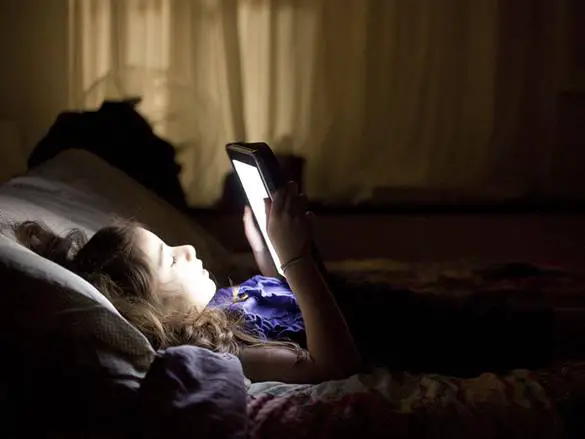The Lightning Research Center (LRC) at Rensselaer Polytechnic Institute has carried out studies to examine the effect of backlit electronic devices on sleep patterns in young adults. Television screens, tablets and mobile phones have all been developed to emit a bright white light for the user, as technological experts expand the range of opportunities for the users of electronic devices.
[Read also: 5 Electronics to Streamline Your Geek’s Life]
Melatonin – The “hormone of darkness”
This light is formed of short-wavelength light rays which have been proven to disrupt the body’s circadian rhythm. Circadian cycles are essentially the body’s natural biological cycles which repeat in accordance with the cycle of sunlight. They can be measured by the release of the hormone, Melatonin, which is naturally produced by the body’s pineal gland as a ‘timing messenger’ to signal when it is time to sleep and time to wake up. The research, led by the director of LRC’s Light and Health Program, Mariana Figueiro, found that a 2 hour exposure to the light emitted by these screens can suppress melatonin production by 22% which may affect the user’s ability to sleep.
[Read also: Better Computer Screen Lighting with f.lux]
For today’s generation of young electronic device users, this is a particular concern because sleep deprivation has been linked to leading to more serious conditions such as diabetes and obesity later in life.
[Read also: Smartphone Screen – Is Bigger Always Better?]
Light level, duration and distance
In the research by LRC, 13 individuals who participated in the study were asked to carry out different activities on tablets, such as playing games, reading and watching movies. They were divided into 3 groups to compare the effects of the backlit screens in different conditions, whilst wearing light meter devices to record their light and activity levels (Dimesimeters). The tablet screens were set to full brightness to accurately measure the effects of prolonged exposure on their circadian stimulation levels. The first group wore goggles with a blue filter because blue light is known to suppress melatonin production. The second group wore orange goggles which were designed to simulate darkness due to the colour’s ability to filter out short wavelength radiation. The third group of participants wore no goggles.
The researchers found that melatonin production was affected by the duration of exposure to the light and the user’s distance from the screen. When a user is closer to a screen, naturally more of the light reaches the sensitive retina at the back of the eye and thus triggers a suppression of melatonin.
[Read also: Studies Proved Laptop Radiation and Other Forms of Low Level Radiation Pose Risk to Users]
An urge for more “circadian-friendly” devices
Mariana Figuerio hopes that these results could urge electronic device manufacturers to design products adapted to increase/decrease circadian stimulation depending on the time of day. For example, the devices’ light emission should be reduced at night, in preparation for sleep, and increased in the mornings.
In the meantime, it is advised that users of these luminous devices should dim their screens in the evening and limit their usage times. The research found that one hour of exposure has little effect on circadian stimulation, whilst 2 hours shows a considerable suppression of melatonin.
[Read also: How to Take Care of Your Health when Working at a Computer]
Are you having trouble sleeping since you bought that laptop, iPad, iPhone or Samsung Galaxy S3? Do you think they’re causing you to lose sleep? Tell us what you think in the comments.


Until they invent a screen that doesn’t harm health, I’ll try to stay as little as possible in front of it and I wear glasses with special lenses, that refract the light.
Hi Peter,
Hmm.. and I’ve always wondered why I can’t find myself to get sleepy when I’m reading manga on my tablet. This actually makes perfect sense. So, it’s the suppression of melatonin that’s doing my unsleepy habit at night. I guess I should regulate my tablet reading at night.
Thanks for the sharing of the “secrets” to the healthy living. I will try to purchase the right glasses.
This is very scientifically established that all Blue/White LED lighting systems cause the suppression and depletion of Melatonin, the most important hormone and free radical scavenger in the human body…not only a sleep regulator…the incidence of cancers is a direct result of this horrible technology…this stuff is in our street lights, automobiles, homes…on and on…it is literally killing us…light at night, EMF/RF all cut off the production of melatonin….please take notice and care in the serious limitation or elimination of after dark usage or exposure to any of these technologies!!!!